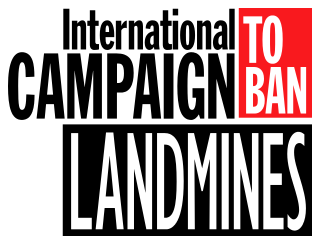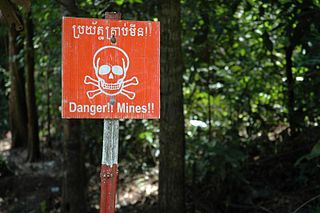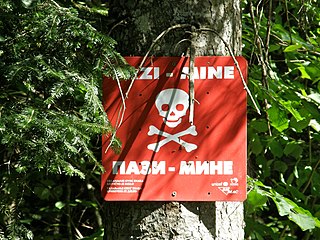Related Research Articles

A land mine, or landmine, is an explosive weapon concealed under or camouflaged on the ground, and designed to destroy or disable enemy targets, ranging from combatants to vehicles and tanks, as they pass over or near it.

A cluster munition is a form of air-dropped or ground-launched explosive weapon that releases or ejects smaller submunitions. Commonly, this is a cluster bomb that ejects explosive bomblets that are designed to kill personnel and destroy vehicles. Other cluster munitions are designed to destroy runways or electric power transmission lines.

The International Campaign to Ban Landmines (ICBL) is a coalition of non-governmental organizations whose stated objective is a world free of anti-personnel mines and cluster munitions, where mine and cluster munitions survivors see their rights respected and can lead fulfilling lives.

The HALO Trust is a humanitarian non-government organisation which primarily works to clear landmines and other explosive devices left behind by conflicts. With over 10,000 staff worldwide, HALO has operations in 28 countries. Its largest operation is in Afghanistan, where the organization continues to operate under the Taliban regime that took power in August 2021.

The Convention on the Prohibition of the Use, Stockpiling, Production and Transfer of Anti-Personnel Mines and on their Destruction of 1997, known informally as the Ottawa Treaty, the Anti-Personnel Mine Ban Convention, or often simply the Mine Ban Treaty, aims at eliminating anti-personnel landmines (APLs) around the world.

Demining or mine clearance is the process of removing land mines from an area. In military operations, the object is to rapidly clear a path through a minefield, and this is often done with devices such as mine plows and blast waves. By contrast, the goal of humanitarian demining is to remove all of the landmines to a given depth and make the land safe for human use. Specially trained dogs are also used to narrow down the search and verify that an area is cleared. Mechanical devices such as flails and excavators are sometimes used to clear mines.

Cambodia is a country located in Southeast Asia that has a major problem with landmines, especially in rural areas. This is the legacy of three decades of war which has taken a severe toll on the Cambodians; it has some 40,000 amputees, which is one of the highest rates in the world. The Cambodian Mine Action Centre (CMAC) estimates that there may be as many as four to six million mines and other pieces of unexploded ordnance in Cambodia. Some estimates, however, run as high as ten million mines.
Fondation suisse de déminage (FSD) is a Swiss non-governmental organisation specialising in mine action. Since its creation in 1997, FSD has carried out operations in some 30 countries on four continents. Its programmes include the following four components: humanitarian demining, explosive ordnance risk education, victim assistance, and stockpile destruction and management. In 25 years, more than 1.4 million items of explosive ordnance have been neutralised by FSD.
A mine clearance organization, or demining organization, is an organization involved in the removal of landmines and unexploded ordnance (UXO) for military, humanitarian, or commercial reasons. Demining includes mine clearance, as well as surveying, mapping and marking of hazardous areas.

The region of Nagorno-Karabakh and areas around it are considered to be some of the most heavily mined regions of the former Soviet Union. Mines were laid from early 1990s by both Azerbaijani and Armenian forces during and after the First Nagorno-Karabakh War. The worst-affected areas are along the fortified former contact line between Azerbaijani and Armenian forces, in particular in the districts of Aghdam, Fuzuli and Jabrayil. According to military experts from both Azerbaijan and Armenia, the ground in those areas is covered with "carpets of land mines." The region has the highest per capita rate in the world of accidents due to unexploded ordnance.
In 2004, Chechnya was the most land mine-affected region in the world.
Mine action is a combination of humanitarian aid and development studies that aims to remove landmines and reduce the social, economic and environmental impact of them and the explosive remnants of war (ERW).

The Mines Advisory Group (MAG) is a non-governmental organization that assists people affected by landmines, unexploded ordnance, and small arms and light weapons.
J. Daniel Livermore is a Canadian academic and historian who was formerly a foreign service officer in Canada's Department of Foreign Affairs and International Trade.

Land mine contamination in Bosnia and Herzegovina is a serious aftereffect of the Bosnian War, which took place from 1992 until 1995. During this time period, all 3 conflicting factions planted land mines near the current-day political entity borders. As a result, the country has had the most severe land mine problems in the world. Although landmine removal efforts have made progress throughout the country and the landmine-related deaths have steadily decreased each year, many people are still killed or suffer injuries caused by unexploded munitions in Bosnia and Herzegovina. Despite the threat of landmines, people enter contaminated areas out of economic necessity.

The United Nations Mine Action Service (UNMAS) is a service located within the United Nations Department of Peacekeeping Operations that specializes in coordinating and implementing activities to limit the threat posed by mines, explosive remnants of war and improvised explosive devices.
Gender mainstreaming in mine action is the application of gender mainstreaming to mine action. It is increasingly being adopted by international and state mine action organizations.

ITF Enhancing Human Security is a humanitarian, non-profit organization founded by the Republic of Slovenia., which specializes in land mine clearance and post-conflict reconstruction. It was established on 12 March 1998 with the purpose of helping Bosnia and Herzegovina in its post-conflict rehabilitation, specifically with mine clearance and assistance to mine victims.

People with disability in Algeria are protected under the law. Algeria has adopted the Convention on the Rights of Persons with Disabilities and the Arab Charter on Human Rights. Algeria is working to make the country more accessible to people with disabilities. Overall, about 2.5 percent of the country has some type of disability with men having a higher rate of disability than women.

Ukraine globally ranks as one of the states with the highest civilian casualties from landmines and unexploded ordnances, and the highest for anti-vehicle mine incidents. As of April 2023, it is estimated that approximately 174,000 square kilometers of Ukrainian territory are contaminated by landmines. Many types of landmines have been found in use in Ukraine, including novel variants. Though landmines have been in use since 2014 in Ukraine during the War in Donbas (2014–2022), their use was relatively sporadic until the Russian invasion of Ukraine. According to Human Rights Watch, both Russian and Ukrainian government forces have utilized antipersonnel and anti-vehicle mines.
References
- ↑ Bombs: Israel Stays Mum On Use Of Deadly Munitions. Eugene Register-Guard. 2006-10-06. p. 7. Retrieved 2023-06-09.
- ↑ Landmine Monitor 2009. Monitor. p. 105. ISBN 978-0-9738955-5-1.
- ↑ "Fighting a Tech War against Land Mines". Esri. 2018-11-13. Retrieved 2023-06-09.